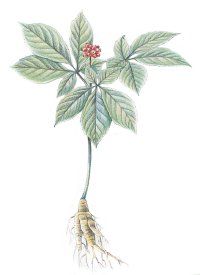So popular is this herb that more than 50,000 people are employed worldwide in the ginseng industry. Rather than addressing specific conditions, ginseng is used to treat underlying weakness that can lead to a variety of conditions.
For example, among its many uses, ginseng is recommended as an herbal remedy for people who are frequently fatigued, weak, stressed, and affected by repeated colds and flu. Ginseng is an adaptogen, capable of protecting the body from physical and mental stress and helping bodily functions return to normal.
Advertisement
The enthusiasm over ginseng began thousands of years ago in China, where the Asian species of ginseng, Panax ginseng, grows. So valued was China's native species, the plant was overharvested from the wild, causing scarcity and increased demand. A mature woods-grown root of Panax ginseng will sometimes fetch $1,000 or more. A mature wild woods-grown root of Panax ginseng will sometimes fetch $200,000 or more!
When a similar species, Panax quinquefolius, was noted in the early American colonies, tons of the plant were immediately dug and exported to China. Many American pioneers made their living digging ginseng roots from moist woodlands. As a result, ginseng has become rare in its natural habitat in the United States as well. Ginseng is now cultivated in forests or under vast shading tarps.
Many people believe the cultivated ginseng has slightly different properties from the natural wild specimens. The Asian species is said to be the superior medicine, compared to the American species, but the two species have slightly different applications. The Asian Panax ginseng is said to be a yang tonic, or more warming, while the American Panax quinquefolius is said to be a yin tonic, or more cooling. Both the ginseng and the quinquefolius species are qi tonics, or agents capable of strengthening qi, our vital life force.
In traditional Chinese medicine, our vital qi is composed of two opposing forces, yin and yang. Yin and yang are dualistic opposites that churn and cycle in all life and, indeed, all matter. The yang aspect of the life forces is the bright, hot, external, dispersive, dynamic pole. The yin aspect is the dark, moist, internal, contracted, mysterious pole. All people, all plants, all matter, and yes, even all diseases have their yin and yang aspects.
Traditional Chinese medicine is very sophisticated in its observation of these phenomena; thus, all botanical therapies are fine-tuned accordingly. Panax ginseng, for example, might be recommended to warm and stimulate someone who is weak and cold from nervous exhaustion. Panax quinquefolius, on the other hand, is best for someone who is hot, stimulated, and restless from nervous exhaustion and is feverish. It is good for someone experiencing a lot of stress (and subsequent insomnia). American ginseng is used in China to help people recuperate from fever and the feeling of fatigue associated with the heat of summer. To learn more about the medicinal uses of ginseng, read the next page.
To learn more about treating common medical conditions at home, try the following links:
- For an overview of all of our herbal remedies, go to the main Herbal Remedies page.
- To learn more about treating medical conditions at home, visit our main Home Remedies page.
- One of the best things you can do for your health and well being is to make sure you are getting enough of the vital nutrients your body needs. Visit our Vitamins page to learn more.
This information is solely for informational purposes. IT IS NOT INTENDED TO PROVIDE MEDICAL ADVICE. Neither the Editors of Consumer Guide (R), Publications International, Ltd., the author nor publisher take responsibility for any possible consequences from any treatment, procedure, exercise, dietary modification, action or application of medication which results from reading or following the information contained in this information. The publication of this information does not constitute the practice of medicine, and this information does not replace the advice of your physician or other health care provider. Before undertaking any course of treatment, the reader must seek the advice of their physician or other health care provider.Before engaging in any complementary medical technique, including the use of natural or herbal remedies, you should be aware that many of these techniques have not been evaluated in scientific studies. Use of these remedies in connection with over the counter or prescription medications can cause severe adverse reactions. Often, only limited information is available about their safety and effectiveness. Each state and each discipline has its own rules about whether practitioners are required to be professionally licensed. If you plan to visit a practitioner, it is recommended that you choose one who is licensed by a recognized national organization and who abides by the organization's standards. It is always best to speak with your primary health care provider before starting any new therapeutic technique.
Advertisement
